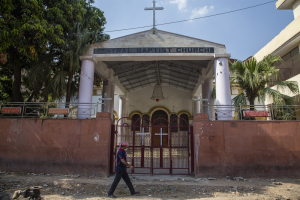Pastor says deconstruction has become 'trendy,' shares how to love those struggling with doubt

As more and more Christian leaders publicly leave the faith, a pastor has weighed in on the “deconstruction” movement and shared how the Church can best love those struggling with doubt.
Pastor Dominic Done, who himself went through a “season of deconstruction and reconstruction,” is the founder of Pursuing Faith, a ministry focused on equipping Christians to successfully navigate culturally pertinent issues relating to faith, doubt and apologetics.
In a recent appearance on “The Crazy Happy Podcast,” a show from Daniel Fusco and the Edifi Podcast Network, Done, who also authored the book When Faith Fails, shared how Christians can help a person turn their deconstruction into “reconstruction that’s redemptive.”
“Something's happening right now and I'd say especially over this last year, even last six months, we're seeing so many people deconstruct their faith, walk away from the faith, say that they don't believe,” Done said. “I think in many ways it's because we don't know how to respond to doubt in our life. Part of it is bad theology, part of it is cultural assumptions that we carry into our walk with Jesus.”
Done identified two dangers when it comes to doubt. The first, he said, is “demonizing” it and seeing it as the “great enemy.”
“When we don't know what to do with thorny, gritty, raw, unanswered or unanswerable questions … we kind of press it down,” he said. “Doubt can lead to a place of sin, which is unbelief. Unbelief is a sin, but doubt is kind of the neutral space in between that can lead to a deeper faith or can lead to deeper unbelief.”
The second unhealthy response to doubt is “idolizing” it, where it’s viewed as “the answer.”
“The trendy thing right now is that we’ve got to deconstruct our faith, walk away from the faith, walk away from the church,” he said. “But the problem with that is, while I think deconstruction can be healthy if it's a … sloughing off of things that are unhealthy in our life, views of God that aren't correct, things that we've kind of taken on board that [aren't] essential to our faith — that form of deconstruction can be really healthy. But if it's just deconstruction for the sake of deconstruction, it's not going to lead you anywhere.”
Following Jesus, he stressed, is “truly edgy.”
“You want to be countercultural? You want to be different? You want to stand out? You want to be someone who's revolutionary, then follow the carpenter from Nazareth,” he explained. “I think there's a beauty in this secular time in which we live. There are some cracks in secularism that I think the seeds of the Gospel can be planted in.”
In recent years, a number of high-profile Christian leaders and pastors have publicly left the Christian faith after a season of “deconstructing,” while a recent study from Gallup found that fewer than 50% of Americans belong to a church or religious organization.
Grammy-winning vocalist Kevin Max, a member of the popular Christian band DC Talk, revealed that he considers himself to be an “exvangelical” and explained where he is on his journey in deconstructing.
“I like to call it deconstruction, reconstruction,” he said. “Any person that's really changing every day, which we do, you're going to deconstruct or you're going to reconstruct. So it's a combination of both of those things.”
In April, Paul Maxwell, a former Desiring God writer and the author of the book The Trauma of Doctrine,announced he is no longer a Christian. Last year, Jon Steingard, the Canadian Christian rock band Hawk Nelson’s lead vocalist, revealed on social media that “I no longer believe in God,” explaining “it didn’t happen overnight.”
On “The Crazy Happy Podcast,” Done contended that while seasons of deconstruction can be “helpful or even fruitful if it leads to flourishing,” deconstruction for the sake of deconstruction is not.
“Sooner or later you need a worldview. Sooner or later you need something that's going to keep you warm from the storm. Sooner or later you're going to need a metric that will guide your life.”
The most loving thing a Christian can do for someone who is deconstructing and walking away from their faith is “not judging them,” but rather saying, “How can I lead you through this? How can I walk with you, through your season of doubt?’”
Satan loves to “cause us to withdraw from others to put up walls,” the pastor stressed, adding: “But it's in that place of secrecy that [doubt] grows, it becomes malignant. I think the healthiest way that we can work through seasons of doubt or deconstruction is in community.”
To those doubting their faith, Done offered the encouragement: “You’re not alone.”
“Open your Bible and the Bible is filled with men and women who are in that space of doubting, struggling,” he said. “There are so many people who are in that space … we have those people in our life that God has brought to us that we can open up with, we can share with. And from that place, then I think discernment comes.”
Deconstruction can be an opportunity to grow, the pastor reiterated.
“Maybe we just need to look at it as opportunity, or questions, or uncertainty or mystery. And in that place, there is room to grow,” he said. “Now the flip side … doubt can be toxic if we don't handle it well. Doubt can lead us to a dark place if we idolize it. And that's why I think conversations have to be had in the Church ... what is doubt, what does Scripture actually say about it, and how do we respond to it.”





























